Kartell's Thierry side table adds a bit more saturation and sophistication to any space! The exuberant design created by Piero Lissoni combines steel and tempered glass in a fun, yet functional way. Simple in form but not lacking in fabulousness, the Thierry tables look stunning standing on their own – yet by combining tables of different shades, shapes, and sizes, you can also create maximalist ensembles that won’t go unnoticed.
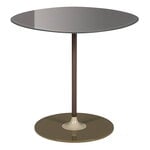

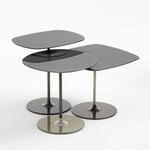
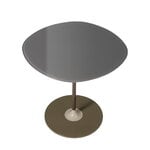
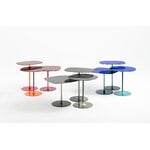
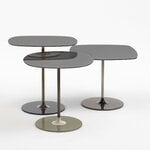
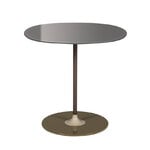
Thierry side table, 45 x 45 cm, grey
Kartell
Description
Kartell's Thierry side table adds a bit more saturation and sophistication to any space! The exuberant design created by Piero Lissoni combines steel and tempered glass in a fun, yet functional way. Simple in form but not lacking in fabulousness, the Thierry tables look stunning standing on their own – yet by combining tables of different shades, shapes, and sizes, you can also create maximalist ensembles that won’t go unnoticed.
Product details (9)
- Colour
- Grey
- Length
- 45 cm
- Width
- 45 cm
- Height
- 45 cm
- Diameter
- 45 cm
- Table top material
- Back-painted tempered plate glass
- Base material
- Painted steel
- Weight
- 11.5 kg
- Care instructions
- Clean the product with a soft damp cloth soaked in soap or a liquid detergent diluted in water. Use specific products for glass to clean the top: apply with a damp cloth that has been properly squeezed out. After cleaning, dry the product carefully using a soft cloth.
- Product ID
Designer
The Italian designer and architect Piero Lissoni (b.1956) is know for his modern and minimalistic furniture design. Lissoni studied architecture in Milan graduating in 1978. Six years later he started working as a Art Director and designer at the Italian architecture office Boff.
A couple of years later he established the architect studio Lissoni Associates together with Nicolatte Canes. He has designed several interiors for big events and companies, and also designed products to companies like Kartell.
View all productsReviews (0)
Sustainability
The Product Sustainability Framework, our criteria of sustainable design, helps you find the most sustainable products in our selection. Read below which sustainability criteria this product has met.
Working conditions & labour 9/9
-
Equal opportunities for all employees
-
Commitment to UN Global Compact, fair compensation for all employees
-
Corporate responsibility requirements defined and communicated for suppliers
-
Systematic work for improved inclusion and well-being in the workplace
-
Transparent supply chain
-
Suppliers' compliance to a code of conduct ensured
-
Direct suppliers audited and certified
-
Compliance to the UN Guiding Principles on Business and Human Rights ensured in the supply chain
-
Support for community involvement in the supply chain
Eco-friendly production 8/9
-
Fair and resource-wise water-use in production
-
No incineration or landfilling of returned items
-
No use of endangered species as materials
-
No direct environmental emissions or waste (excl. GHGs) from production
-
The sustainability of direct suppliers' production is addressed and monitored
-
Production and material sourcing that respect biodiversity, animal rights, and natural ecosystems
-
Material-efficient and ecological packaging
-
No potentially harmful chemicals used in own production
-
Positive impact on nature’s well-being through operations that regenerate natural ecosystems
Climate impact 4/8
-
Company's direct greenhouse gas emissions identified and commitment to reduction
-
Product's carbon impact identified and commitment to reduction
-
Guidance on energy- and eco-efficient use of the product
-
Contribution to climate initiatives beyond the brand’s direct operations
-
Low-carbon or compensated transportation
-
Carbon footprint of the product calculated and goals set to reduce it
-
100 % renewable energy in own production and operations
-
Carbon neutral or carbon negative product
Sustainable materials 5/6
-
Sustainable and long-lasting material choices
-
No harmful or hazardous substances
-
Responsible raw material sourcing and production
-
Materials suited for circularity: monomaterials, recyclable finishings, renewable or recycled contents etc.
-
Ecological materials: natural, biodegradable, recyclable or recycled contents
-
Outstanding materials in terms of innovativeness, responsibility, sustainability and circularity: local production or sourcing, 100 % recycled content, C2C-certification etc.
Circular design 4/5
-
High aesthetic quality promoting long-term use of the product
-
Technically durable product design and material choices
-
Design for enduring life-long quality
-
Design and support for product maintenance, repair and upgradability
-
Innovative circular design solutions: circular service system, resale platform, remanufacturing, collection of used products, etc.








